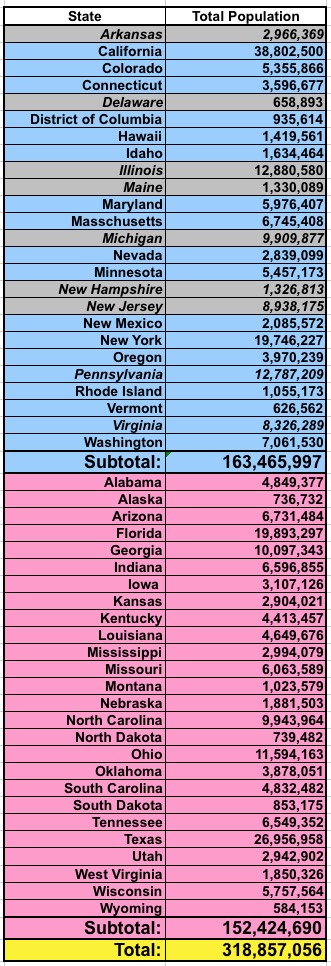In which Politico reporters Racahan Pradhan & Brett Norman FINALLY answer a question I've been wondering for months...
Ever since I first wrote about the Halbig v. Sebelius case (later Halbig v. Burwell, then shifted over to King v. Burwell shortly thereafter), the one question I've never been able to get a straight answer on is whether Oregon, Nevada and/or New Mexico would be legally defined as "exchanges established by the state" in the even that the Supreme Court does end up ruling in favor of the King plaintiffs.
Today, I finally received as close to a definitive answer as anything, via a Politico article on the case:
Ironically, three states that experienced monumental failures when they initially tried to create exchanges might hold the closest thing to a golden ticket.
Nevada and Oregon both had tech meltdowns. New Mexico never even got its technology off the ground. Yet all three were officially approved by HHS as state exchanges in 2013, and they haven’t lost that status even though they are using HealthCare.gov to sign up people. Neither the administration nor the plaintiffs in their legal briefs to the Supreme Court dispute that they are state exchanges. That’s why the briefs refer to subsidies in 34 states, not all 37 that are using HealthCare.gov.
“What we have is a supported state-based marketplace,” Nevada exchange Executive Director Bruce Gilbert said. “It really is the best of both worlds, if you will.” The state manages the insurance market and consumer outreach. The federal government provides the IT infrastructure. Gilbert says he’s talked to several other states, including Vermont, Maine and Delaware, about this model.
OK, there you have it: Three more states--one of which, Oregon, is solidly Democratic-leaning, while the other two are, as I understand it, considered slightly left-of-center overall--would be in the clear even in a worst-case scenario.
That means that instead of 73% of states whose tax credits are at risk being primarily Republican (27 / 37), it's actually 79% (27 / 34).
That also means that, as noted in the quote above, if the SCOTUS does kill off "federal exchange" subsidies, the OR/NV/NM model is the way through...if the 34 remaining state administrations are willing to play ball (and of course, most of them aren't).

Of those 34 states, the ones I'd imagine would be most likely to set up exchanges via this route would be:
- Arkansas (believe it or not, AR actually did authorize the creation of their own full exchange; the only problem is that it's not set to be operational until fall of 2016...so they'd still be in the same boat as the other 33 states from 1/1/16 - 12/31/16)
- Delaware (Dem Governor, Dem legislature...the only reason they didn't do so already was because of the expense for a small state...but if the OR/NV/NM model is kosher, I'd expect them to jump all over it)
- Illinois (IL's Democratically-controlled state legislature had multiple chances at setting up their own exchange...with a Democratic governor, even. However, they blew it by letting the clock run out on both federal funding and a friendly governor; Gov. Quinn's replacement, Bruce Rauner, is solidly anti-ACA)
- Pennsylvania (the new Democratic Governor is all for it, but the GOP state legislature would presumably try to block him)
- New Jersey (GOP Gov. Chris Christie may be pressured either to or not to set up an exchange depending on how his flailing Presidential campaign is going by this summer. Presumably the Dem-held state legislature would try to put one through).
- Michigan (While MI is completely controlled by Republicans via the tea party wave of 2010/2014, Gov. Rick Snyder was half-heartedly in favor of setting up a full exchange back in 2010, and at least 1 GOP State Senator, Jim Marleau, has stated on the record that he's open to the idea).
- Maine (Tea party Republican Governor, state legislature split between Dems and GOP)
- Virginia (Dem governor, GOP-held state legislature)
If all 8 of these states went through with the "establishment" of an "exchange" (at least the bare minimum necessary to satisfy a theoretical SCOTUS definition), that would make the tally pretty much dead even: 24 states (+DC) with their own exchange, 26 states without...all of which are exclusively Republican-controlled.
Gee, sound familiar?
How to support my healthcare wonkery:
1. Donate via ActBlue or PayPal
2. Subscribe via Substack.
3. Subscribe via Patreon.



